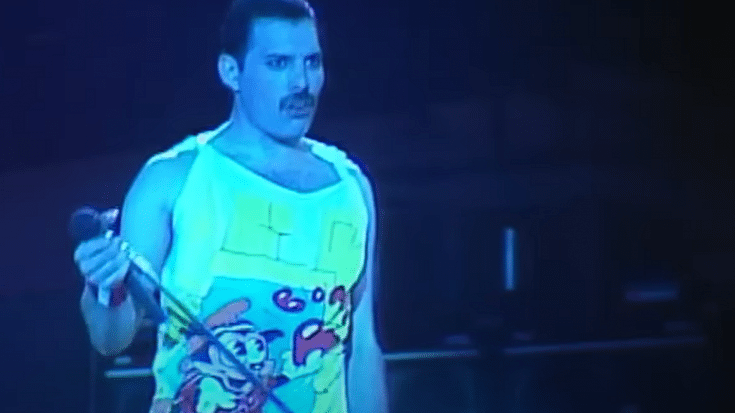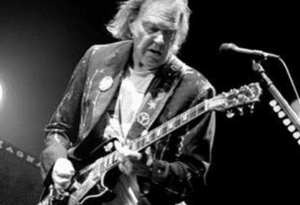Why George Lucas Sent A Cease And Desist Letter To Queen

via Queen Official / Youtube
Queen, led by the charismatic Freddie Mercury, remains an enduring symbol of the 1970s, captivating audiences with their distinctive sound and theatrical performances. Concurrently, the 1970s gave birth to another cultural phenomenon in the form of Star Wars, a film franchise that left its own lasting mark on popular culture.
Nevertheless, intriguing intersections between Queen and Star Wars emerged, revealing unexpected connections. One noteworthy instance involves Queen’s incorporation of the iconic Star Wars character, Darth Vader, into their live shows.
This unexpected fusion of rock music and science fiction captured the imagination of fans and demonstrated the cultural permeability of these influential realms.
In exploring this unique collaboration, it’s fascinating to explore the reactions elicited by this unconventional pairing. But there was one who didn’t like the unlikely connection: the creator of Star Wars himself, George Lucas, who, at one point, sent the band a cease and desist letter.
“and I don’t like Star Wars…”
When Freddie Mercury proclaims, “I don’t like Star Wars“, midway through the initial verse of Queen’s single “Bicycle Race”, it isn’t intended as a scathing cinematic critique. Contextually, the song reveals that Mercury’s statement is more a reaction to the overwhelming cultural influence of Lucas’ blockbuster than a specific commentary on its content.
By 1978, when “Bicycle Race” was released as part of a double-A-side record with “Fat Bottomed Girls”, Star Wars had permeated every facet of popular culture, becoming a ubiquitous touchstone for mainstream movie-goers, akin to Steven Spielberg’s earlier phenomenon, Jaws, which Mercury had just disclaimed in the same line as not being his “scene”.
During that period, before the weight of prequels and decades of anticipation had accumulated, opposing Star Wars was synonymous with countering the prevailing zeitgeist—a declaration of oneself as the ultimate cultural contrarian.
It’s noteworthy that Mercury aligns with the sentiments of Harlan Ellison, the outspoken figure in science fiction, who once dismissed the film as “adolescent nonsense”. In this way, Mercury’s stance against Star Wars in “Bicycle Race” reflects a rebellious posture against the prevailing cultural norms of the time.
Freddie’s Star Wars theatrics
According to Vanity Fair, in selected concerts between 1979 and 1980, Freddie made a dramatic entrance onto the stage by perching atop the shoulders of an individual clad in Darth Vader attire.
Immortalized in a renowned photograph from a Queen concert, Mercury is captured donning a Flash Gordon t-shirt—a visual emblem that adds a layer of intrigue to the spectacle.
This striking image becomes even more fascinating when considered against the backdrop of Flash Gordon, a film emblematic of the surge in science fiction productions during the 1980s. Notably, this cinematic wave was a deliberate attempt to capitalize on the unprecedented success of Star Wars.
Mercury’s choice to sport a Flash Gordon t-shirt while engaging in such theatrical antics not only underscores the convergence of music and film but also prompts questions about the intentional or coincidental interplay between Queen’s performances and the zeitgeist of 1980s science fiction cinema.
The Flash Gordon connection
What set Flash Gordon apart from its sci-fi counterparts was its distinctive soundtrack, a musical masterpiece crafted by the legendary band Queen. The film not only sought to ride the wave of 1980s science fiction popularity, following in the footsteps of Star Wars, but it also brought a unique sonic dimension courtesy of Queen’s musical prowess.
Mercury’s choice to wear a Flash Gordon shirt while perched on the shoulders of a Darth Vader-clad figure introduces a compelling layer of interpretation.
On one hand, this could be perceived as a shrewd promotional tactic, aligning Queen’s live performances with the film’s visibility. Alternatively, it opens the door to speculation about Mercury’s subtle commentary on the comparative merits of Flash Gordon and Star Wars.
The juxtaposition of these iconic elements not only speaks to the symbiotic relationship between music and film but also invites exploration into Mercury’s personal expressions and perspectives within the cultural landscape of the time.
https://twitter.com/77MASH/status/1732071706506690616
Darth Vader wasn’t Freddie’s only conquest
While Mercury’s unconventional stage entrance was well-received by his audience, it did not find favor with everyone. George Lucas expressed strong disapproval.
According to Is This the Real Life?: The Untold Story of Queen, Lucas reportedly went so far as to threaten Queen with legal action to prohibit further use of Darth Vader in their performances. This legal warning achieved its desired effect, leading Queen to cease incorporating the formidable Sith Lord into their live shows.
Notably, Darth Vader was only one of many fictional characters integrated into Queen’s performances. In addition to the Star Wars antagonist, the band staged shows featuring Mercury seated on the shoulders of an individual dressed as Superman.
Intriguingly, this occurred during a time when the Superman film franchise was enjoying its peak, aligning with the period when Mercury executed this particular stunt.
Freddie is actually a fan
In subsequent years, during the premiere of the fourth Star Wars film, 1999’s The Phantom Menace, Queen guitarist Brian May attempted to offer congratulations to George Lucas. However, the director showed little interest, walking by without acknowledging May.
As a result of this encounter, some individuals speculated that the purported feud between Queen and the director persisted even after Mercury’s passing. Media outlets propagated rumors suggesting the late vocalist harbored animosity towards Star Wars, creating a narrative that endured for a time.
May eventually dispelled these misconceptions, providing clarity on the relationship between Queen and the esteemed filmmaker.
In a separate interview discussing the song “Bicycle Race”, May elaborated on its meaning, clarifying that the lyrics did not mirror Mercury’s personal life or beliefs. Contrary to the song’s narrative, May revealed that Mercury was, in fact, a fan of George Lucas’ Star Wars franchise, dispelling any notions of antipathy towards the iconic series.












